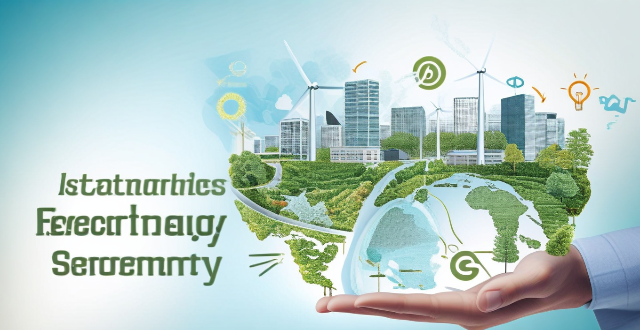Sustainable Ethics

What role does environmental ethics play in sustainable development ?
The text discusses the significance of environmental ethics in sustainable development, emphasizing its role in recognizing the importance of the environment, promoting stewardship and responsibility, encouraging sustainable practices, addressing environmental justice issues, and fostering collaboration and partnerships. It highlights that by understanding the interconnectedness of all life on Earth, we can make more informed decisions about how to use and protect natural resources. The text also points out that environmental ethics promotes the idea of stewardship, which involves taking responsibility for protecting and preserving the environment for future generations. Furthermore, it encourages sustainable practices such as recycling, reducing carbon emissions, and using eco-friendly products to reduce our impact on the environment and contribute to long-term sustainability. Additionally, the text emphasizes the importance of addressing environmental justice issues to ensure fair access to natural resources and protection from environmental harm. Finally, it suggests that environmental ethics fosters collaboration and partnerships between individuals, communities, governments, and businesses to work together towards sustainable development goals.

What is climate ethics and why is it important in today's world ?
Climate ethics is a branch of philosophy that examines the ethical implications of human activities contributing to global warming and explores ways to mitigate its effects. It matters because it addresses the fundamental question of how we should live our lives and interact with the environment to ensure a sustainable future for all. Key principles of climate ethics include the precautionary principle, intergenerational solidarity, environmental justice, sustainable development, and common but differentiated responsibilities. By embracing these principles and taking action based on them, we can work towards creating a more just, equitable, and sustainable world for all.

How does climate ethics relate to the concept of intergenerational justice ?
Climate ethics and intergenerational justice are important concepts that guide us in making decisions that promote a more equitable and sustainable future for all generations. Intergenerational equity, the precautionary principle, and sustainable development are key principles that should be considered when making decisions about resource use and emissions reductions. Governments, businesses, and individuals can all play a role in promoting climate ethics and intergenerational justice by adopting sustainable practices and supporting policies that prioritize climate action.

What role do corporations have in upholding climate ethics ?
The text discusses the vital role of corporations in maintaining climate ethics, emphasizing their responsibilities in areas such as emissions control, innovation for sustainability, education and advocacy, stakeholder engagement, and making ethical investment decisions. Corporations are urged to take proactive steps towards reducing direct and supply chain emissions, investing in green technologies, promoting eco-friendly products, raising consumer awareness about environmental issues, influencing policies that support climate ethics, engaging with affected communities, and being transparent about their environmental performance. Additionally, companies should consider green investments and divest from fossil fuel industries to demonstrate a commitment to combating climate change. The essay concludes that corporate actions set standards for others, playing a crucial part in fostering a global approach to climate ethics.

In what ways does academic integrity relate to professional ethics ?
**Academic Integrity and Professional Ethics: An Interconnected Relationship** The concepts of academic integrity and professional ethics are fundamentally interconnected, sharing principles like honesty, fairness, responsibility, respect, and courage. Academic integrity lays the groundwork for professional ethics by instilling foundational skills such as critical thinking, research integrity, and ethical decision-making. These skills transition from academia to profession, building reputations for reliability and trustworthiness. Therefore, promoting academic integrity is crucial not only for the academic community but also for the broader professional world.

How can environmental ethics influence policy-making ?
Environmental ethics can play a significant role in shaping policies by raising awareness, promoting sustainable practices, encouraging public participation, and influencing international relations.

Why is sustainable investing important ?
Sustainable investing is crucial for the future of our planet and society. It considers environmental impact, social responsibility, long-term returns, risk management, and ethical considerations of companies. By investing in sustainable companies, investors can help combat climate change, create a more equitable society, and achieve long-term financial returns. Sustainable investing also aligns with many people's personal values and ethics.

How can education promote environmental ethics ?
Education is crucial for fostering environmental ethics among students by integrating interdisciplinary approaches, real-world examples, and skill development. Experiential learning through field trips, hands-on projects, and community engagement helps instill a deeper connection with nature. Teaching sustainable practices like reducing waste and conserving energy encourages responsible resource management. Encouraging critical thinking through debates and research assignments enhances understanding of complex environmental issues. Cultivating empathy and responsibility involves promoting nature connectivity and global perspectives. Assessment and reinforcement strategies such as project-based assessments and recognition programs help evaluate and motivate students' commitment to environmental stewardship.

How can environmental ethics help address climate change ?
Environmental ethics, a branch of philosophy, examines the moral relationship between humans and nature. It helps in addressing climate change by recognizing nature's intrinsic value, promoting stewardship and sustainability, encouraging intergenerational equity, and fostering global cooperation.

What is environmental ethics and why is it important ?
Environmental ethics, a branch of philosophy, explores the moral relationship between humans and nature. It's crucial for sustainability, biodiversity protection, addressing climate change, enhancing life quality, promoting social justice, encouraging stewardship, informing policy making, raising awareness, stimulating innovation, and fostering global cooperation. This discipline emphasizes our duty to preserve the environment for future generations by considering the long-term implications of our actions.

What are the key principles of environmental ethics ?
The text introduces the concept of environmental ethics, which is a branch of philosophy focusing on the moral relationships between humans and the natural environment. It outlines key principles such as respect for nature, sustainability, precautionary principle, intergenerational equity, biodiversity conservation, ethical consumption, ecological justice, holistic thinking, stewardship, and education and awareness. These principles serve as guiding lights in promoting an ethical relationship with the environment, aiming to create a more sustainable and equitable world.

In what ways do indigenous communities' rights intersect with climate ethics ?
The text discusses the intersection of indigenous communities' rights and climate ethics, emphasizing the disproportionate impact of climate change on these communities due to their reliance on natural resources and traditional practices. The analysis outlines key points related to land rights, cultural heritage, participatory rights, environmental justice, and responsibility for losses. It argues that recognizing and supporting indigenous rights is crucial for promoting sustainable development and environmental justice, as well as being a moral imperative for effective climate action.

How can environmental ethics be integrated into business practices ?
Integrating environmental ethics into business practices is essential for sustainable development and responsible corporate citizenship. This can be achieved by adopting a sustainability mindset, assessing environmental impact, implementing eco-friendly practices, promoting green innovation, engaging in corporate social responsibility (CSR), complying with regulations and standards, and fostering a culture of continuous improvement. By doing so, companies can mitigate their environmental impact, enhance their reputation, attract socially conscious consumers, and potentially increase profitability through resource efficiency and innovation.

How can I start investing sustainably ?
Investing sustainably involves prioritizing environmental, social, and governance (ESG) factors in your investment choices. Here's a guide on how to start: 1. Educate yourself about ESG factors through online courses, books, and financial news. 2. Define your goals for sustainable investing, such as supporting values-aligned companies or mitigating climate risks. 3. Assess your current investments to see if they align with your sustainability goals. 4. Choose your investment vehicles, including sustainable mutual funds, green bonds, impact investing, or divestment. 5. Research and select investments based on ESG ratings, company sustainability reports, and performance history. 6. Monitor and rebalance your portfolio regularly to maintain your desired level of sustainability. 7. Engage as a shareholder by voting on ESG-related resolutions and supporting sustainable boards. 8. Stay informed and adapt to new regulations, clean technology advances, and market trends. By following these steps, you can contribute to a more responsible and equitable future while achieving long-term growth.

Is it ethical to engage in deforestation for agricultural purposes ?
Is it ethical to engage in deforestation for agricultural purposes? This question requires a nuanced understanding of both environmental ethics and the needs of agriculture. The case against deforestation includes loss of biodiversity, climate change, and soil erosion and water quality issues. However, the case for agricultural deforestation includes food production, economic opportunities, and sustainable practices. To navigate the ethical implications of deforestation for agriculture, a balanced approach is crucial, including reducing new land needed, regenerative agriculture, agroforestry, policy and regulation, and public awareness. While the need for agricultural land is pressing, engaging in deforestation without considering its broader ecological consequences is not ethically sustainable. It is essential to find ways to meet our agricultural needs while also preserving the integrity of our planet's ecosystems. By promoting sustainable agriculture and implementing protective measures, we can move towards a future where food production and forest preservation coexist harmoniously.

How can businesses contribute to sustainable consumption ?
Businesses can contribute to sustainable consumption by adopting circular economy principles, managing green supply chains, using eco-friendly packaging, practicing product stewardship, improving energy efficiency, conserving water, engaging in responsible marketing, promoting innovation, engaging stakeholders, and supporting environmental initiatives. These practices help reduce waste, minimize resource use, and inspire sustainable consumer behavior.

What are the main sources of sustainable energy ?
The text discusses the various main sources of sustainable energy, including solar energy, wind energy, hydropower, geothermal energy, bioenergy, tidal and wave energy, and hydrogen energy. It also highlights the importance of adopting sustainable energy for environmental impact, economic benefits, energy security, and health considerations. The transition to sustainable energy requires investment, policy support, and technological innovation.

How does sustainable consumption impact the economy ?
Reduced resource depletion, lower energy costs, increased innovation, and improved public health are some of the key benefits of sustainable consumption. While there may be short-term costs associated with transitioning to more sustainable practices, the long-term benefits far outweigh these costs.

How can sustainable investing help achieve the United Nations Sustainable Development Goals ?
Sustainable investing, which incorporates environmental, social, and governance criteria into investment decision-making, can significantly contribute to achieving the United Nations Sustainable Development Goals. It promotes environmentally friendly practices, enhances social well-being, advances economic growth and innovation, upholds good governance and partnerships, drives market trends towards sustainability, and attracts conscience-driven consumers. By aligning financial objectives with positive societal impact, sustainable investing creates a framework for long-term, sustainable growth that benefits people, planet, and profit.

How do I choose a sustainable investment fund ?
Choosing a sustainable investment fund requires careful consideration of various factors, including your investment goals, the fund's ESG criteria and performance history, the experience of the fund manager, the fund's holdings and alignment with your values, fees and expenses, and ongoing monitoring of your investment. By following these steps, you can select a sustainable fund that aligns with your financial goals and personal values.

What are the risks of sustainable investing ?
Sustainable investing carries risks such as inconsistent screening criteria, limited investment opportunities, higher costs, regulatory and legal issues, market risks, and reputational risks. Investors should carefully consider these risks before making investment decisions to ensure that sustainable investing aligns with their goals and risk tolerance.

What impact have celebrities had on promoting sustainable fashion ?
### Summary: Celebrities significantly influence sustainable fashion promotion by raising awareness, shaping trends, supporting eco-friendly brands, driving industry changes, and setting personal examples of sustainability. Through campaigns, social media engagements, and public appearances in sustainable fashion, they encourage followers to adopt more environmentally conscious choices. Their actions not only increase the visibility of sustainable brands but also push for greater transparency and ethical practices within the fashion industry.

What are the benefits of using sustainable energy sources ?
Using sustainable energy sources provides environmental, economic, and social benefits. These include reduced greenhouse gas emissions, improved air quality, conservation of natural resources, protection of ecosystems, cost savings, job creation, energy independence, stable energy prices, improved public health, community resilience, education and innovation, and increased energy access. Transitioning to sustainable energy is essential for our future prosperity and survival.

How can we ensure that the benefits of sustainable development reach everyone, including the most vulnerable groups ?
The text discusses how sustainable development can be ensured to reach everyone, including the most vulnerable groups. It suggests a multifaceted approach that involves balancing economic growth, social inclusion, and environmental protection. The strategies include developing inclusive policies, ensuring access to opportunities like education and training, investing in sustainable infrastructure and accessible services, encouraging community engagement and advocacy, and implementing monitoring and accountability measures. By working together across sectors and levels of society, a more equitable and sustainable future can be built for all.

What are the benefits of sustainable consumption ?
The text discusses the benefits of sustainable consumption, which include environmental protection, economic benefits, social well-being, and ethical considerations. By making conscious choices about what we consume and how we dispose of our waste, we can reduce our carbon footprint, conserve natural resources, preserve biodiversity, save costs, create jobs, promote healthier lifestyles, ensure equitable distribution of resources, build community, protect animal welfare, support fair trade, and encourage transparency and accountability in businesses. Sustainable consumption is crucial for creating a more sustainable future for ourselves and future generations.

What is the importance of sustainable agriculture in achieving the Sustainable Development Goals ?
Sustainable agriculture is crucial for achieving the United Nations' Sustainable Development Goals by ensuring food security, improving rural livelihoods, and protecting the environment. It promotes soil health, increases crop yields, encourages biodiversity, creates jobs in rural areas, enhances income, promotes gender equality, reduces greenhouse gas emissions, conserves water resources, prevents land degradation, supports climate change mitigation and adaptation, stimulates economic growth, and reduces poverty. By adopting sustainable agriculture practices, we can create a more equitable and resilient world for future generations.

How can we promote sustainable development to reduce the risk of climate conflicts ?
Sustainable development is crucial for reducing the risk of climate conflicts. To promote it, we can increase awareness and education, promote renewable energy sources, implement sustainable agriculture practices, invest in green infrastructure, encourage waste reduction and recycling, and collaborate with governments and NGOs.

How does sustainable investing work ?
Sustainable investing, also known as responsible or impact investing, involves making investment decisions based on environmental, social, and governance (ESG) criteria. The goal is to generate long-term financial returns while also considering the broader impact of investments on society and the environment. Here's how sustainable investing works: 1. Identify ESG Criteria: The first step in sustainable investing is to identify the ESG criteria that align with your values and risk tolerance. This could include factors such as carbon emissions, labor practices, diversity, board composition, and more. 2. Screen Investments: Once you have identified your ESG criteria, you can screen potential investments to ensure they meet your standards. This can be done through negative screening (excluding companies that don't meet certain criteria) or positive screening (selecting companies that exceed certain criteria). 3. Integrate ESG into Investment Process: Sustainable investing goes beyond simply screening investments; it involves integrating ESG considerations into the entire investment process. This includes researching companies' ESG performance, engaging with them to encourage improvements, and monitoring their progress over time. 4. Measure Performance: Like any investment strategy, it's important to measure the performance of your sustainable investments. This includes tracking financial returns as well as evaluating the impact of your investments on society and the environment. 5. Rebalance and Review: Finally, sustainable investing requires ongoing monitoring and rebalancing of your portfolio to ensure it continues to align with your ESG criteria and financial goals. This may involve selling off underperforming investments or reallocating funds to new opportunities that better meet your standards.

What challenges do we face in achieving a continuous supply of sustainable energy ?
The challenges to achieving a continuous supply of sustainable energy include technological limitations, economic barriers, political and social factors, infrastructure and grid integration issues, and environmental impacts. Addressing these challenges requires collaboration between governments, businesses, and individuals to work towards a more sustainable future for our planet.

What are some examples of sustainable investments ?
Sustainable investments are becoming increasingly popular as investors seek to generate financial returns while also contributing to environmental and social causes. Examples of sustainable investments include green bonds, sustaple stocks, impact investing, and sustainable real estate. These investments offer benefits such as reducing carbon emissions, promoting renewable energy sources, supporting fair labor practices, and potentially earning competitive returns over time. By choosing to invest sustainably, investors can play an active role in protecting the environment, creating a more equitable society, and achieving financial success.